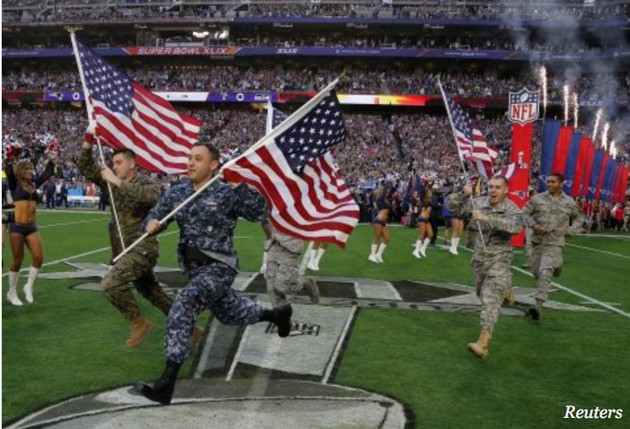Pro football looms large in modern America’s consciousness in all ways, but notably so in what we’ve been discussing as ChickenhawkPaid Patriotism. Ben Fountain’s wonderful novel, Billy Lynn’s Long Halftime Walk, builds its whole plot around a halftime “Salute to the Heroes!” at a nationally televised Dallas Cowboys game. And NFL teams were prominently featured in the Sen. McCain/Sen. Flake exposé on the Pentagon’s underwriting of pro-veteran and pro-troop displays at sports events.

A reader writes about why he objects in particular to the NFL:
Just wanted to say it has long bothered me that the National Football League foists "tributes to the military" during its games. (Other leagues might bother me just as much, but I pay less attention to them).
I can think of no demographic group in the United States that has a lower rate of service in the US military than the players, owners, and coaches of the National Football League. For members of the NFL, it is virtually always “my career over my country.” I am almost 60 years old, and a lifelong fan of football, but of the thousands of players who have played in the NFL in my lifetime, I can recall only two players—Roger Staubach and Pat Tillman—who have served in the US military. [JF note: I am sure there are more, but like the reader I don’t immediately think of them. I checked the NFL’s site for players/coaches with military connections. The list is here, and it’s mainly “father served in Vietnam,” “brother is in the Reserves” etc.]
Plus, the NFL as an organization does all it can to avoid paying taxes to support those who do serve. And its owners generally have their nose in the trough to gather up as many tax dollars as they can to subsidize their profit-seeking enterprises.
In terms of real military service and support, it would be difficult to find a more concentrated cluster of physical and economic wimpiness than the National Football League.
***
On the more substantive questions of the real respect and accomodation for troops, veterans, and their families, a reader with a military background writes:
I often find myself dumbfounded at the superficial "support" thrown to veterans and as a veteran, insulted at the jingoism-driven lack of true oversight over military spending. For whatever it is worth, I felt I ought to lend you my humble two cents.
I am veteran of the Canadian Army living in the U.S. I served in Afghanistan prior to settling in Virginia with my U.S. wife. Another aspect of the “chicken-hawk economy” that I think is worth more public scrutiny is how veterans integrate into the workforce.
Many large U.S. firms have veteran hiring targets and specialized veteran recruiters. Businesses typically view "veterans" as a homogeneous group that is stereotyped as "you must be good following orders," or "repetitive tasks don't faze you," and many others. Some are positive, but most I typically find off-putting and indicative of a society that understands little (nor seems to want to understand) of what service entails.
Every veteran is unique. Some 25 year olds negotiated peace settlements between warring tribes. Some 25 year olds fixed armored vehicles. Some 25 year olds ran Pashto-language radio stations. The work performed by former members of the military should be treated equal to work performed by non-former members of the military by potential employers.
I am confident enough in the work done by veterans overseas that it can (or should) easily compete with those with equivalent civilian world experience. I find that US hiring managers seem to want to avoid the details of my service, in favor of a more superficial treatment of me as a "veteran" who can "obey orders." The accomplishments of veterans are not given the opportunity to speak for themselves because of this "chicken-hawk society" in which those not directly engaged with the armed services pay it lip service but do not want to dive into the grittier details.
Post 9/11 veterans engaged in an unprecedented type of conflict. The nature of counterinsurgency in the information age dictated that major decisions, that in prior generations would have been made by Colonels and Generals, were decentralized to some of the lowest levels. A generation of veterans holding some of the strongest leadership credentials of any generation is being undervalued and stereotyped by the society to which it returns. This is wrong from a business perspective, and an unethical way to treat those who served.